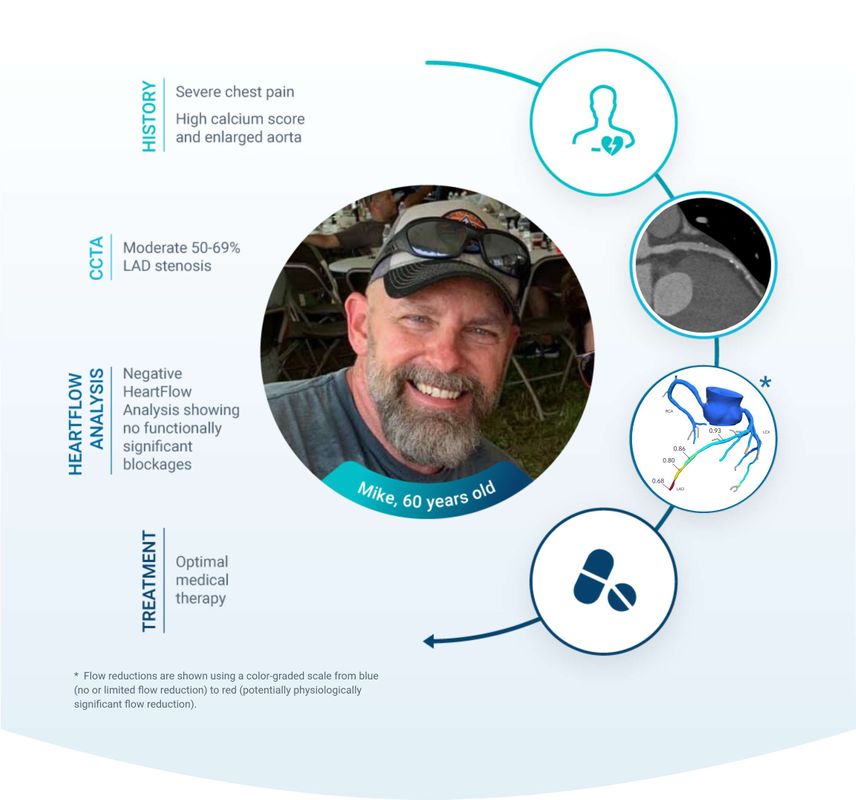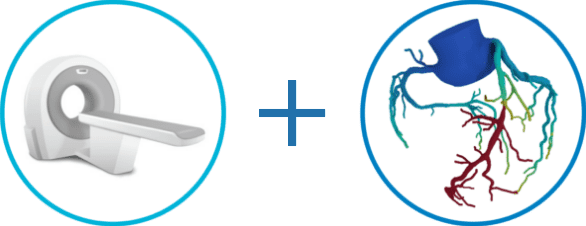Coronary Artery Disease (CAD) is the most common type of heart disease, affecting nearly half of the adult population. Getting the correct diagnosis for your symptoms is crucial in determining the appropriate treatment.
With traditional non-invasive diagnostic tests, 20-30% of patients are sent home with their disease undetected, often leading to fatal results, while 55% of patients sent for an invasive, diagnostic cath end up not having obstructive disease. This invasive procedure is not without risk to the patient, takes time and money, and can create additional anxiety.
Why risk missing disease or having an unnecessary invasive procedure when there is a better alternative?
Mike Gartman, a 60-year old accountant, knew that his family had a history of heart disease. His father had passed at age 44 from a heart attack, and since then, Mike has been a huge advocate for heart disease prevention. For much of his life, Mike was an active backpacker and golfer who regularly met with an integrative doctor to mitigate his risk of heart disease. But like many during the pandemic, his level of activity slowed down; with the arrival of his grandchildren, he had even less time to spend on being physically active.
Despite his general good health, in August of 2021 Mike suddenly experienced such severe chest pain that he doubled over in the shower. His cardiologist, Dr. Mark East, immediately ordered a coronary CT based on Mike’s age, family history, and an enlarged aorta that had shown up on a prior calcium scan. Mike’s CT scan revealed a potentially severe stenosis in his left anterior descending (LAD), and the radiologist determined that a HeartFlow FFRCT Analysis was necessary to understand the true impact the stenosis was having on blood flow in the arteries.
The HeartFlow Analysis came back within hours, indicating there was some flow limitation toward the distal end of the LAD, but this did not pose much concern. Mike’s cardiologist decided against the placement of a stent and determined that the use of statins and maintaining a healthy lifestyle would control Mike’s coronary artery disease. Without the information gained from the HeartFlow Analysis, Mike would have undergone an unnecessary invasive procedure.
It’s reassurance and peace of mind that I’m not getting a false negative from traditional cardiac tests,
said Mike.

Mike Gartman
It’s reassurance and peace of mind that I’m not getting a false negative from traditional cardiac tests.


Mike went into the hospital expecting the worst. Instead, he was able to avoid an unreliable exercise stress test3 as well as an unnecessary invasive procedure. The process was quick and only required one hospital visit, with results ready and available in his electronic medical record in only a few hours. For Mike, realization of the real impact and value of this advanced test came when he was able to see his own HeartFlow Analysis.
Being able to see the personalized 3D model of his coronary arteries really put Mike’s mind at ease about his disease and risks.
I feel really good, like I can still do something about it. I don’t have to get bypass surgery or get stents, but I can do things to have better control of my coronary artery disease like lose weight and keep my blood pressure down. I always have the HeartFlow model in the back of my mind and keep reminding myself that I have to keep it blue.
Mike has since worked on improving his lifestyle, has lost weight, and is determined to keep his HeartFlow Analysis ‘blue’. The HeartFlow Analysis also helped reinforce with his physicians the importance of a non-invasive diagnostic pathway that can provide accurate results, while also minimizing the resource burden of unnecessary testing.
I was very lucky that I had chest pain and was able to get a HeartFlow Analysis in a way. For me, it was a wakeup call that made me go, ‘Hey, I have a chance here…I can still improve my lifestyle and keep my disease at bay. I might make it all the way to the end without a heart attack.’

Mike Gartman
I was very lucky that I had chest pain and was able to get a HeartFlow Analysis in a way. For me, it was a wakeup call.

To address the current gaps in cardiac diagnostic testing, this pathway:

Request a patient information kit to discuss the HeartFlow Analysis with your physician.
REFERENCES




HeartFlow Analysis is consisted of four main functions; FFRCT, Planner, Roadmap, and Plaque. All four functions are cleared for clinical use in the United States, Bahrain, Israel, and United Arab Emirates. Only FFRCT and Planner functions are cleared cleared for clinical use in Europe, United Kingdom, Australia, Canada, and Japan. Please see HeartFlow Analysis Indications for Use and Instructions for Use for more information.
© 2024 HeartFlow, Inc. | HeartFlow and the HeartFlow logo are registered trademarks of HeartFlow, Inc. Additionally, RoadMap is claimed as a trademark of HeartFlow, Inc. www.heartflow.com | 331 E Evelyn Ave, Mountain View, CA 94041
*Required fields
If you would like to request to have the HeartFlow Analysis available at a location near you, please submit your information below with details of the institution. We will share this information with the institution, but it will not guarantee HeartFlow will become available.
*Required fields
オンライン提出フォームから研究助成金を申請してください。
HeartFlow FFRCT 分析は、有資格の臨床医による臨床的に安定した症状のある冠状動脈疾患患者への使用を目的とした個別化された心臓検査です。 HeartFlow Analysis によって提供される情報は、資格のある臨床医が患者の病歴、症状、その他の診断検査、および臨床医の専門的判断と組み合わせて使用することを目的としています。
ハートフロー分析に関する追加の適応情報については、次のサイトをご覧ください。www.heartflow.com/indications.
さらに質問がある場合は、このメッセージを閉じてフォームに記入するか、サポート チームにお電話ください。: 877.478.3569.
The HeartFlow FFRCT Analysis is a personalized cardiac test indicated for use in clinically stable symptomatic patients with coronary artery disease by qualified clinicians. The information provided by the HeartFlow Analysis is intended to be used by qualified clinicians in conjunction with the patient’s history, symptoms, and other diagnostic tests, as well as the clinician’s professional judgement.
For additional indication information about the HeartFlow Analysis, please visit www.heartflow.com/indications.
If you have additional questions, close out of this message to complete our form or call our support team: 877.478.3569.Please use our online submission form on the Clinical Research Page to apply for research grants.
Thank you for your interest!

Executive Vice President and Chief Medical Officer
Campbell brings a wealth of experience to HeartFlow, where he serves as the Chief Medical Officer. Prior to joining HeartFlow, he was the Chief Scientific Officer and Global Head of Research and Development at Cordis Corporation, Johnson & Johnson, where he was responsible for leading investments and research in cardiovascular devices. Prior to Cordis, he was Associate Professor of Medicine at Harvard Medical School and the Harvard-M.I.T. Division of Health Sciences and Technology, and Director of the Cardiac Catheterization and Experimental Cardiovascular Interventional Laboratories at Brigham and Women’s Hospital. He served as Principal Investigator for numerous interventional cardiology device, diagnostic, and pharmacology trials, is the author of numerous journal articles, chapters, and books in the area of coronary artery and other cardiovascular diseases, and was the recipient of research grant awards from the NIH and AHA.
He received his A.B. from Harvard College and his M.D. from Harvard Medical School.